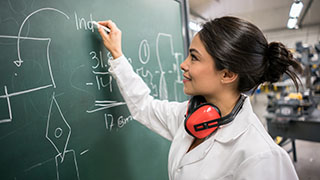
As the new school year begins, let’s ensure that by overcoming COVID-19, we leave our education … [+]
My daughters know only a post-9/11 world. They don’t blink when asked to put items from their pockets into a bin so they can pass through a magnetometer at a sporting event. They know that surveillance cameras are pretty much everywhere. They wouldn’t dream of putting more than 3.4 ounces of liquid into their airplane carry-on. They accept these as norms because they know nothing different.
They weren’t yet born on this day, 19 years ago, when terrorists flew planes into the World Trade Center in New York City, the Pentagon in Washington D.C., and a remote field in Shanksville, PA. They didn’t feel the pain of learning that nearly 3,000 people were killed in those attacks or experience the fear of not knowing what new attacks may come next.
Many things changed after 9/11. We went to war. We stood up new government agencies. For better or worse, we significantly altered our domestic and international policy. We became a more security-conscious society and our collective cry became “Never Forget.”
Today, we are experiencing another national emergency with long-term implications on our society. But my daughters are front and center on this one. They will distinctly remember what life was like before and after COVID. They are feeling firsthand the stress and anxiety of social distancing, of awkward masks, missed gatherings with friends and loved ones, and canceled trips and sports seasons.
Perhaps more than anything, they will remember the impact the pandemic has had on their education. The start of the school year traditionally brings nervous excitement as they rekindle friendships, meet teachers, and orient themselves to a new schedule and curriculum. Not so this year. Their “virtual” experience has been rough as both teachers and students are adjusting to a completely new reality that leaves them tied to their desk and computer screen.
There is not much good news lately, for sure. Will we overcome these hard times? Of course. And as we do, let’s hope we emerge with some new education norms:
The end of the “Digital Divide.” Consistent and reliable connectivity is foundational to creating a virtual learning environment. Without it, learning stops or never starts. More than 21 Million households remain without reliable connectivity. Every day that kids and their parents cannot connect with their education provider they fall further and further behind their peers. We should do everything to support efforts increasing access for all.
Teacher training geared for a new learning environment. Teachers are faced with an enormous new challenge to keep kids engaged remotely. What does this mean for how we train teachers and support them throughout the year? What skills are now most important, and how do we empower teachers with them? We are encouraged to see some publishers adapting their curriculum to help educators through this crisis. We’re also seeing organizations provide very tactical planning guidance for how to organize discussions, facilitate breakout groups, and keep students involved and learning.
Schools respected for the true role they play in our communities. The loss of in-person learning over the last year has only confirmed the critical role that schools play in our communities and in our lives. Never have we felt their value more in providing food security, social interaction, mentorship, physical activity, culture, emotional well-being, and support for our children. Our schools are arguably the most important part of a community. They, and the teachers and staff that sustain them, deserve as much financial backing as we can provide them, and they need creative partnerships with companies and policymakers to ensure they function to their full potential.
The acknowledgement that measuring progress matters. Soon after schools shuttered their doors in the spring of 2020, the Department of Education waived annual standardized tests for that year—and rightly so. Recently, they rejected requests by states to further cancel annual standardized tests for the school year ending in 2021—again, rightly so. The Department deserves credit for holding firm on the need to understand where students stand academically, especially when most have experienced such an extended school closure. Assessments may very well look different or be administered differently in the future. We should invite and encourage that innovation, provided it continues to gauge learning.
We have the opportunity now to help define education in the post-COVID world. It is a chance to make impactful changes that will help our children recover and grow from this unprecedented moment.





More Stories
Launch of Altura – a Blended Learning Solution from Macmillan Education India
How education can succeed in times of crises
Abdul Aziz Al Ghurair Refugee Education Fund Partners with Discovery Education